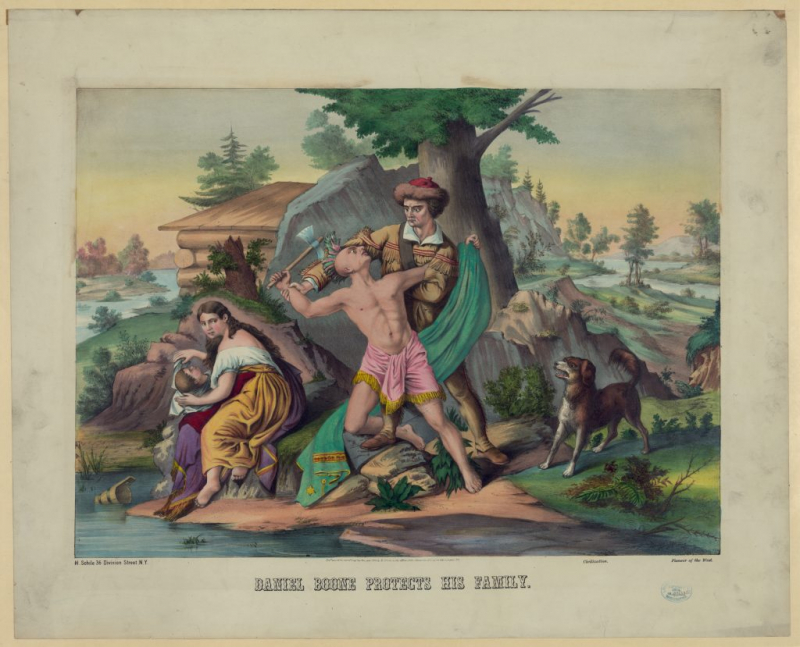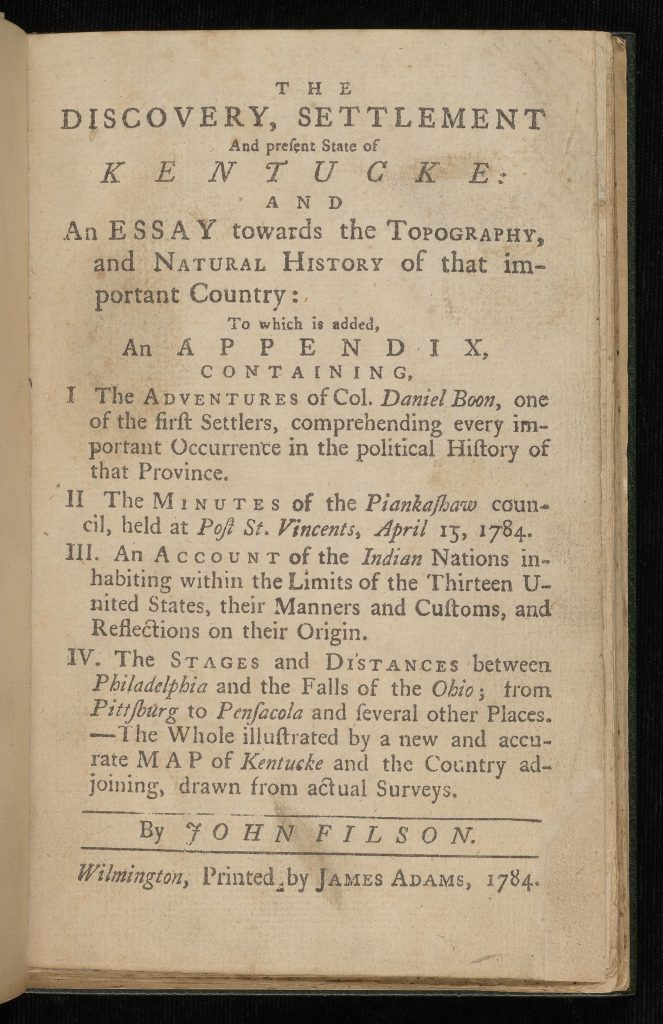Daniel Boone

Daniel Boone (1734-1820) was an American frontiersman. Boone was an American pioneer and explorer who helped to explore Kentucky's new colony, so opening up America to the uncharted west. He established Boonesborough, one of the first communities west of the Appalachian Mountains. He participated in the American Revolutionary War before settling in eastern Missouri. He became an iconic folk figure and symbol of the American frontiersman who ventured into uncharted western territories.
Boone was born near Reading, Pennsylvania, on October 22, 1734, the son of Squire Boone and Sarah Morgan Boone. Boone's parents were Quakers, but due to a disagreement between Squire Boone and the Society of Friends, the family left Pennsylvania about the beginning of May 1750 and settled near the Yadkin River in what is now Davie County, North Carolina, in October of that year. Daniel Boone was on his way to his first extended journey as a professional hunter. He left the family's camp in the Shenandoah Valley with one buddy and spent several months hunting in the Blue Ridge Mountains and along the Roanoke River.
Boone was a teamster on General Edward Braddock's ill-fated expedition to Fort Duquesne in 1755, following which he returned to the Yadkin Valley and married Rebecca Bryan, a member of a notable local family, on August 14, 1756. They had six sons and four girls and settled near present-day Farmington, Davie County, North Carolina. Boone temporarily relocated his family to Culpeper County in early 1760 to avoid the fighting of the Cherokee War and then resumed his business as a professional hunter in the backcountry. He traveled as far as the Holston and Clinch rivers, earning a reputation for his proficiency with a pistol and traps.
Boone and five colleagues crossed the Cumberland Gap into Virginia's Kentucky wilderness in May 1769. They stayed there for two years, exploring, hunting, and trapping before returning to the Yadkin Valley in the spring of 1771. In September 1773, Boone returned to Kentucky, escorting a small band of farmers who wanted to build a community there, but Indians attacked the party and killed one of Boone's sons on the way. Boone and his family relocated to the Clinch River valley and stayed for two years. During Dunmore's War in 1774, Boone was a captain in the Fincastle County militia, directing the region's fortifications under Colonel William Preston's leadership.
In the Kentucky Portion of Virginia
Richard Henderson, a North Carolina land speculator, hired Boone in 1775 to construct a route from the westernmost towns into Kentucky. The path, later known as the Wilderness Road, led from present-day Kingsport, Tennessee, across the Cumberland Gap to the Kentucky River, where Henderson's colonists, including Boone's family, established Boonesborough, one of Kentucky's early communities. The following summer, Indians kidnapped one of Boone's daughters and two of her companions. Boone pursued the party for three days through the bush before rescuing the girls on the banks of the Licking River. Boone's reputation as a woodsman was built on the skills he demonstrated on this and other occasions, but some of the exploits later attributed to him were embellishments of more modest achievements or outright fiction.
Boone led an expedition of around thirty men to the salt springs on the Licking River in January 1778. He was apprehended while hunting in February and carried to the Shawnee leader Blackfish, from whom he learned of an Indian plot to push the whites out of Kentucky. Boone volunteered to obtain the surrender of his soldiers at the salt springs, accompany the Indians to Boonesborough the next spring, and assist them in negotiating the fort's surrender. He eventually persuaded the salt manufacturers to surrender their rifles. Some of the captured individuals were sold to the British. The rest were adopted by Blackfish, including Boone, who was given the name Sheltowee, or Big Turtle. Boone eventually fled in time to return to Boonesborough and command the settlement's victorious defense. However, his intentions were questioned, in part because of the Loyalism of his wife's family, and Boone was eventually summoned before a court-martial. He was acquitted and quickly promoted to major in the militia. After being harmed by the legal action, Boone and some of his friends established a separate hamlet known as Boone's Station, and Boone built his own cabin on Marble Creek, several miles away from Boone's Station.
John Filson’s Book on the Settlement of Kentucky
Following the establishment of Fayette County in 1780, Boone was appointed a lieutenant colonel in the militia, elected to the House of Delegates, and appointed sheriff. He was taken prisoner but swiftly paroled while attending the congress that assembled in Richmond in May 1781 but adjourned first to Charlottesville and then to Staunton when the British army marched up the James River. Early in 1782, Boone returned to Kentucky, and in August of that year, he helped lead an attack on a band of Indians at Blue Lick, when sixty-six Kentuckians were killed, including another of his sons. At around the same period, Boone met John Filson, a Pennsylvania schoolmaster who incorporated a romanticized version of Boone's life in his Discovery, Settlement, and Present State of Kentucky (1784). When a French edition of the book was released in Paris in 1785, it brought Boone international acclaim.
In December 1782, Boone was appointed deputy surveyor of Fayette County and began speculating in land, but his projects failed and he was entangled in costly and futile lawsuits. In 1783, he relocated to Limestone and founded a trade store and bar in the little Ohio River port town. Boone was named a trustee when Maysville was founded in 1787, and he was elected to the House of Delegates from Bourbon County the following year. In 1789, he relocated to Point Pleasant and made another failed attempt to open a business. Boone was elected to the General Assembly for the third time in 1791, representing Kanawha County. He served on the Committee on Propositions and Grievances for all three of his House terms, and in his final term, he was also named to the Committee on Religion. While at the gathering, Boone agreed to supply supplies to the county militia. His shop debts, however, made obtaining credit impossible, and he lost the contract, shuttered his store, and went into a cabin in the woods approximately sixty miles up the Kanawha River from Point Pleasant. For the rest of the decade, Boone was burdened by debt, and a warrant for his arrest was issued in 1798 but never enforced.
Later Years
In October 1799, the Spanish governor of Louisiana handed Boone a parcel of land near the Missouri River at Femme Osage. Boone spent the remaining twenty years of his life in what is now Missouri, but a court found in 1809 that he had not met the criteria of the grant, and he petitioned Congress for a tract of the public domain in appreciation of his services to the country. Congress confirmed his rights to the Missouri land five years later. On September 26, 1820, Boone died at the house of his son Nathan Boone and was buried in the family graveyard. At the request of the Kentucky legislature, bones assumed to be those of Boone and his wife were transferred from a Missouri graveyard in 1845 and reinterred with much ceremony in a cemetery near the state capitol in Frankfort, Kentucky.


























